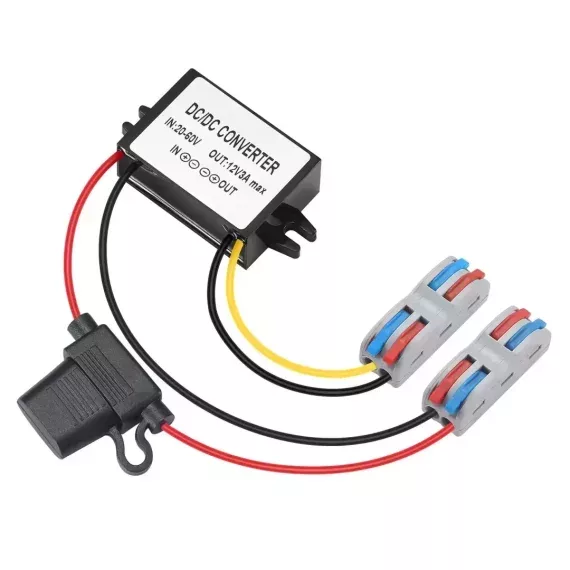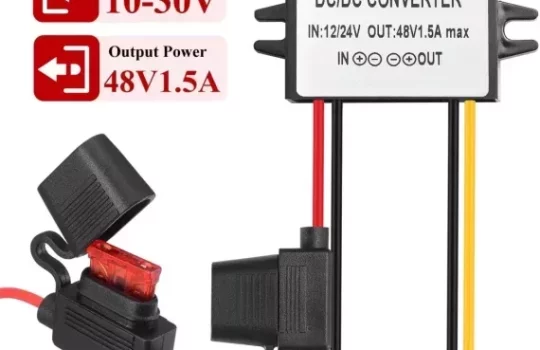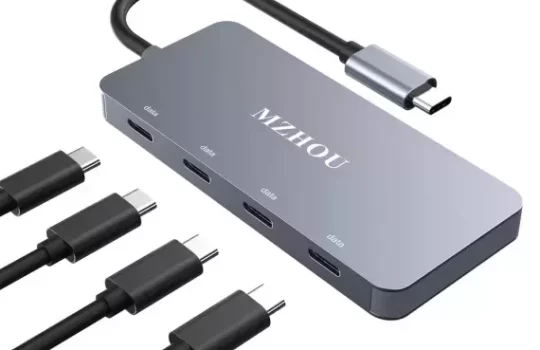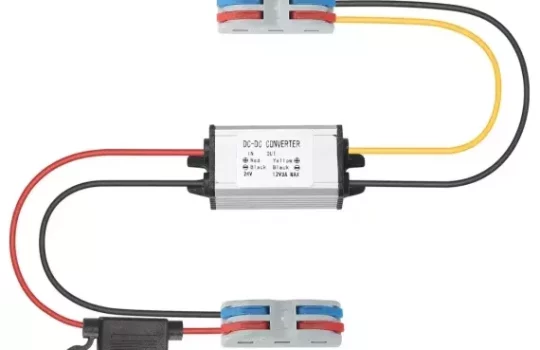Golf carts are a staple in many communities, golf courses, and even residential areas. They’re not just for transporting players around the course anymore; today, golf carts are a versatile mode of transport used for errands, leisure rides, and much more. The electrical systems in these carts typically run on 48V battery packs. While the 48V system is excellent for powering the motor, golf carts often require 12V power to run a variety of accessories, such as lights, radios, GPS devices, and other electrical gadgets. This is where a 48V to 12V voltage reducer becomes crucial.
A voltage reducer steps down the 48V from the golf cart’s battery system to a stable 12V required for smaller accessories. However, choosing the right reducer isn’t as straightforward as picking the first one you come across. The wrong choice can lead to inefficiency, system instability, or even damage to your golf cart’s electrical components. In this article, we will dive deep into how to select the perfect 48V to 12V voltage reducer for your golf cart. We’ll discuss essential factors to consider, how to make an informed choice, and how to install and maintain your reducer for optimal performance.
What is a Voltage Reducer and Why is it Important?
A voltage reducer is an essential component that allows you to run 12V accessories in a 48V electrical system. Golf carts, as mentioned, typically operate on a 48V battery, which powers the motor and major functions of the vehicle. However, many devices and accessories in the golf cart, such as headlights, taillights, a radio, and a GPS, are designed to work on a 12V power supply. A voltage reducer efficiently converts the higher 48V voltage down to the required 12V.
Without a voltage reducer, you would either need to install a separate 12V battery, which takes up valuable space, or run the risk of damaging your accessories by directly connecting them to the 48V system. The voltage reducer ensures your accessories operate safely and efficiently by providing them with the correct voltage.
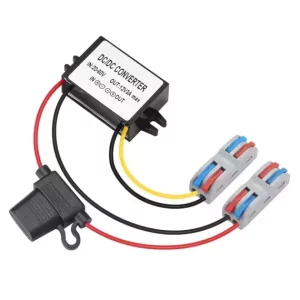
Key Factors to Consider When Choosing a 48V to 12V Voltage Reducer
When selecting a voltage reducer for your golf cart, there are several critical factors to consider. These factors ensure the reducer performs well over time, provides reliable power, and doesn’t compromise the overall performance of your cart.
- Power Rating (Amperage and Wattage)
The first consideration is the power rating of the voltage reducer. Every accessory in your golf cart requires a certain amount of power, which is typically measured in amperes (amps) or watts. The power rating of the reducer tells you how much current it can safely convert from 48V to 12V.
To determine the required power, you’ll need to estimate the power consumption of all the devices you plan to run on the 12V system. For example, if you plan on running lights (approximately 5A), a radio (2A), and a GPS system (1A), you’ll want to ensure your voltage reducer has a power rating that can comfortably supply the combined total.
Here’s a simple formula for calculating power:
Wattage = Voltage × Amps
For example, if your total accessory load is 8 amps at 12V, then the required wattage would be:
Wattage = 12V × 8A = 96W
Once you’ve calculated your total wattage requirement, you should select a voltage reducer that can handle that wattage and more, as some fluctuations in power consumption can occur. It’s generally recommended to select a voltage reducer with a higher amperage rating than you think you’ll need, to avoid overloading.
- Efficiency and Heat Management
Another crucial aspect to consider is the efficiency of the voltage reducer. Efficiency refers to how effectively the reducer converts the input voltage (48V) into the desired output voltage (12V). Higher efficiency means less energy is wasted in the form of heat, resulting in better overall system performance and less strain on your golf cart’s battery.
Inefficient reducers generate excessive heat, which can lead to overheating and damage. Many voltage reducers are equipped with heat sinks or cooling fans to dissipate heat and ensure the reducer operates within a safe temperature range. When selecting a voltage reducer, check the efficiency ratings and ensure it has adequate cooling features if you plan to run high-power accessories or operate the golf cart in hot climates.
An efficient voltage reducer also reduces the stress on the golf cart’s battery, prolonging its lifespan and improving the overall power consumption of the system.
- Compatibility with Your Golf Cart’s Electrical System
Compatibility is perhaps one of the most important considerations when selecting a voltage reducer. The reducer you choose must match the specifications of your golf cart’s electrical system. Since most golf carts use 48V battery systems, the reducer should be designed to handle 48V inputs and convert them to a stable 12V output.
In addition to this, you need to ensure the voltage reducer is compatible with your golf cart’s battery type—whether it’s a lead-acid battery or a lithium battery. Lithium batteries, for example, discharge differently and more evenly than lead-acid batteries, so it’s important to choose a voltage reducer designed specifically for lithium-based systems if that’s what your cart uses.
- Durability and Weather Resistance
Golf carts are often exposed to outdoor conditions, which means their electrical components need to be durable and weather-resistant. If you frequently drive your golf cart through rain, snow, or dusty environments, you’ll want a voltage reducer that can handle these conditions. Look for reducers with an IP rating (Ingress Protection), which indicates how resistant the device is to dust and water.
Also, ensure that the reducer is made of corrosion-resistant materials like aluminum or high-grade stainless steel, especially if you live in areas with high humidity or salty air. These features will help prolong the lifespan of the reducer and ensure it continues to work efficiently over time.

- Size and Mounting Options
The size of the voltage reducer is another key factor. Golf carts have limited space for electrical components, so it’s essential to select a compact unit that can be easily installed without obstructing other components.
Some reducers come with mounting brackets for easy installation, while others are designed for simple placement inside the cart’s battery compartment. Be sure to measure the available space before making your purchase and ensure that the reducer will fit and be securely mounted.
- Brand Reputation and Warranty
When purchasing a voltage reducer, it’s always a good idea to buy from a reputable brand that specializes in golf cart accessories. Established brands typically offer products with higher build quality, better customer support, and extended warranties. They are also more likely to have a proven track record of reliability.
A warranty is particularly important when it comes to electrical components. If something goes wrong with the voltage reducer, having a warranty ensures you won’t be left with the cost of repairs or replacements. Make sure to check the terms of the warranty before making a purchase.
- Ease of Installation and Maintenance
While some golf cart owners may choose to install their voltage reducer themselves, others may prefer to hire a professional. Regardless of your decision, you should choose a voltage reducer that is easy to install and comes with clear instructions. Many models feature plug-and-play installation, while others might require a bit more expertise with wiring and electrical systems.
For long-term maintenance, choose a reducer that doesn’t require excessive upkeep. High-quality reducers generally require minimal maintenance, but it’s important to inspect them occasionally to ensure they’re working efficiently and that no wiring connections are loose or corroded.
Choosing the right 48V to 12V voltage reducer for your golf cart is essential for ensuring the longevity and efficiency of your golf cart’s electrical system. By carefully considering the power rating, efficiency, compatibility, durability, and ease of installation, you can select a reducer that meets the needs of your golf cart’s accessories while protecting the overall system.
Whether you’re installing lights, a radio, or a GPS, the right voltage reducer will ensure these devices operate smoothly, without causing strain on your golf cart’s battery or damaging sensitive components. Always prioritize quality, reliability, and efficiency when selecting your voltage reducer, and remember that it’s often worth spending a little extra on a high-quality unit that will last longer and perform better.
With the right 48V to 12V voltage reducer, your golf cart will be well-equipped to handle all your accessories, making it even more enjoyable and functional for your rides around the course or community.

